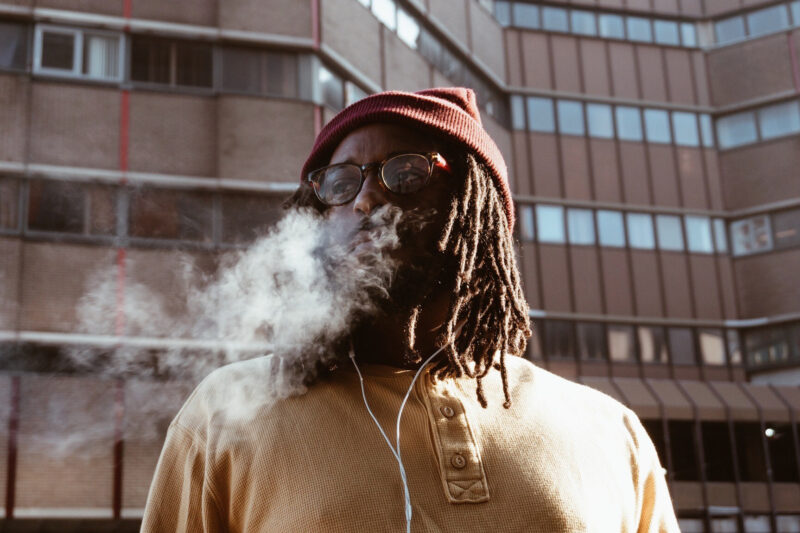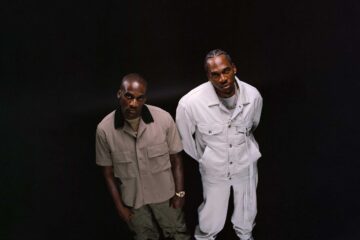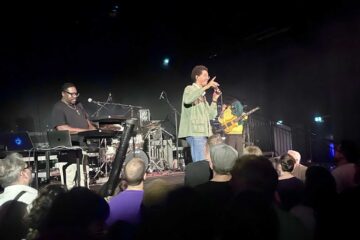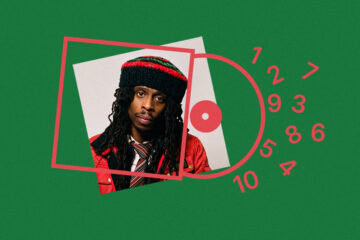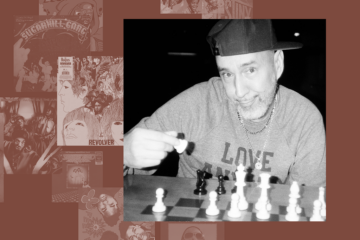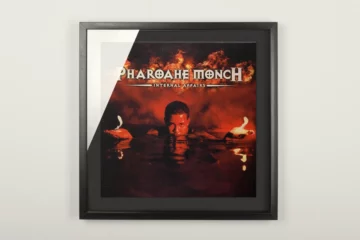»It’s a moment for music to assume its highest form as a healing art and a refuge from chaos«, the liner notes for rap-oddball Quelle Chris’s latest record »Innocent Country 2« states. Whereas that’s true for most of the music Quelle Chris has released so far, it’s also a moment where the world as we know it collapses — bringing something forth that’s hard to see when standing in the eye of a storm: acceptance of a situation which seems to be without alternative. »Innocent Country 2« is both the continuation of a fucked up situation and the antidote to it. It’s the light at the end of the tunnel and the headlight of another train approaching, a hopeful soundtrack in a hopeless moment of time — right when we need it the most.
You can find the Vinyl Records of Quelle Chris in the [Webshop of HHV Records](https://www.hhv.de/shop/de/quelle-chris-hip-hop/i:A70880D2N12S6U9)
»Innocent Country 2« is the most positive and pop savvy record I’ve heard from you since »Ghost at the Finish Line«.
Quelle Chris: Isn’t that ironic?
Yeah, I’m curious how this transition has happened.
That’s a tough question, really, because the album has two points of dark comedic hindsight. First, I was at a point starting to actually see some sort of progress in my career. I finally had my own tours as a headline act. Things were just falling into place. It’s been ten plus years of just straight up non-stop grinding without other jobs. But it has all started to come together. I’m sure that played into the positivity of the album. At the same time the things that seemed to come most to fruition were the negative things anyway. The undertone of »Innocent Country« is like Murphy’s Law. Basically I look up and things are gonna suck balls.
Still, the album sounds like an antithesis to its predecessor. Gone is the hopelessness you conveyed on Part 1, gone is even the anti-everything-vibe of your last record »Guns«. Where does this regained optimism stem from?
The hopelessness isn’t gone. It’s just more of an acceptance of it. There is acknowledgement that shit is fucked up, you know. But hey, what are you going to do about it?
I don’t want to sound cynical, but is it a good starting point for you to be creative?
You find yourself having creative thoughts all the time acting upon them. But is it in any way an equal or better time — definitely not for me. I was supposed to be out there this month, all my tours are canceled and shit. What’s next career wise? This is not just a hobby for me. This is my career. It’s very daunting. You have to replan your entire life let alone your year. When you take that into account, making something out of this situation is not really happening. Right now, priority is the safety of my family.
The name of the album suggests a continuation of »Innocent Country«. Is the situation we faced with Part 1 just going to continue in different situations?
It’s like this »Groundhog Day« thing. Shit is going to continue to be fucked up because there’s always going to be negative energy. The question is: How do you manage to acknowledge the positive in it? »Innocent Country 1« was more like managing it by throwing your hands up and go like »fuck it« whereas Part 2 is throwing your hands up and be like »yay«. To be honest, I don’t know if either is good.
As you speak of acceptance — where have you found it?
You write things and it has a purpose at that time. And its purpose shifts and evolves as the album comes together and life continues. I think making the record was part of the process. After all the things that happened and were around it during the making of it have a strong impact on the acceptance of our situation. It’s like unloading a lot of old baggage. Sometimes there are very weird relationships that go on with the creation process — weird realities, you know. Where it’s like »I love doing this, but I don’t feel like doing it right now.« It’s the combination of all these things that lead up to the songs.
»Innocent Country 2« is the fourth record on the »2Dirt4TV« series you’ve initiated with an EP in 2012. Can you tell me a bit about »2Dirt4TV« and what’s the difference behind it to the usual Quelle Chris release?
The name came up when I was kicking it with Dibia$e for the first »2Dirt4TV« EP back in 2012. I was in Sacramento and he hooked me up with one of his extra rooms. We sat in there for one week and worked out the album. We joked a lot and at some point the general idea that it was »too dirt for TV« came up. The series started to take place going from there. Basically, its theme is that one other person, another entity is handling the production. The first one was Dibia$e, the second one was »Niggas Is Men« which was all produced by Messiah Musik with a couple of joints and some co-production by me. The next one was »Innocent Country« with Chris Keys. And now it’s this one with Chris again.
As with Part 1, Chris Keys plays pretty much all the instruments on the record. How did you first meet Chris?
I met him some years ago in Oakland. He was working on a project with Roc Marciano and I was kicking into Roc a lot during that period of time — he’s an amazing brother and clearly one of the most talented MCs we got out there. So Roc introduced me to Chris. We got into talking about making an album together — the start of a very long process which ultimately turned out to be »Innocent Country« years later. In that process we became close friends and formed a somewhat Dragon Ball Z-ish synergy. The communication and the give-and-take became more and more fluid. The rest is just history (laughs).
»The hopelessness isn’t gone. It’s just more of an acceptance of it. There is acknowledgement that shit is fucked up, you know. But hey, what are you going to do about it? «
Quelle Chris
You’ve mentioned that the production for the first »Innocent Country« record had started years before it came out in 2015. Now some years have passed between Part 1 & 2 — when did you had the idea of making a sequel?
The continuation just came along. There are other projects where you won’t see all the way through for years, you know? With this it was different. I had a show at Oakhella festival in Oakland. At that moment, I already had another project coming along. I hadn’t necessarily started physically working on it, but while I was there I met Chris and he played some joints. It just felt right. The first ones were probably sketches of »Mirage« and »Horizon«. So we were bothering the idea of hitting a sequel to »Innocent Country«. When I came back to New York I listened through Chris’ joints. At this moment I decided that all the other project have to wait. I wanted to focus on »Innocent Country 2«. As you said, Chris was playing all the instruments. It really was like on »Tubular Bells« by Mike Oldfield — one of my favorite albums — where the jacket lists the instruments and there’s Mike Oldfield, Mike Oldfield, Mike Oldfield.
Speaking of Mike Oldfield, what makes »Tubular Bells« so special for you?
You can find a lot of little of nuggets in there. It’s such a journey because it’s visual with its complexity lying in its seeming simplicity. I had fucking good times listening to this record.
A track that really stands out your album is »Sudden Death« because it’s so different to what you’ve done before. Very melodic, very song-like. How did you end up going in this direction?
»Sudden Death« stands in the vein of projects I’ve been doing since the early 2000s called Awesome in Outer Space. There’s three of those. The first one was »Songs About U«, the second one was »Little Sun« and the third one was »Bones for Girls« which is still on Bandcamp, but the record’s not so much about singing (laughs). Honestly, I don’t get to do it too often even if I’ve always had songs, you know. Usually I get to find a good place for them.
Another killer is »Mirage« with features by Earl Sweatshirt, Merril Garbus and Demark Vessey. In the outro Big Sen issues uncertainty and the need for art — which comes across both dystopic and perfectly on point to our current situation. Can you tell me a bit about the production of »Mirage«?
It was one of the first joints that we started. A lot of the times, Chris will do something very short. He gave me a 20-second clip of it, and I was »Yeah, we got to flesh this out«. He then gave me a couple different ranges, different keys — and I just started writing. By that point I knew I wanted to have Earl and Denmark on it. So on the same day I texted both of them and sent them the joint. I contacted them early because I knew it would take the longest — them being birds of a feather, you know, when someone asks me to do something, it’s the part that always takes the longest. I went back to Oakland a second time to continue working with Chris in the same room. Merril was coming through because she wrote the chorus for »Graphic Bleed Outs«. While she was there that day, I thought of having the kind of constant singing in the back of »Mirage«. I laid down some roughs and Merril came and put me to shame (laughs). In the meantime, Earl sent his verses, so we pieced that together. Just as we were rounding home Denmark came through with a killer verse. It’s my second favorite verse on the album.
What’s your favorite verse?
Starr Busby’s verse on »Make It Better« is just … goddamn .. it’s killer!
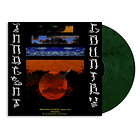
You can find the Vinyl Records of Quelle Chris in the [Webshop of HHV Records](https://www.hhv.de/shop/de/quelle-chris-hip-hop/i:A70880D2N12S6U9)

